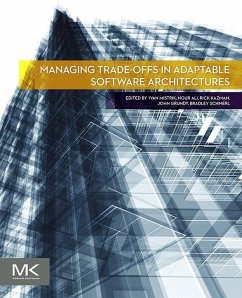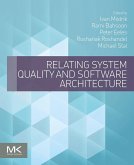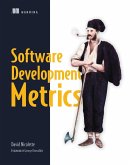Managing Trade-Offs in Adaptable Software Architectures explores the latest research on adapting large complex systems to changing requirements. To be able to adapt a system, engineers must evaluate different quality attributes, including trade-offs to balance functional and quality requirements to maintain a well-functioning system throughout the lifetime of the system.
This comprehensive resource brings together research focusing on how to manage trade-offs and architect adaptive systems in different business contexts. It presents state-of-the-art techniques, methodologies, tools, best practices, and guidelines for developing adaptive systems, and offers guidance for future software engineering research and practice.
Each contributed chapter considers the practical application of the topic through case studies, experiments, empirical validation, or systematic comparisons with other approaches already in practice. Topics of interest include, but are not limited to, how to architect a system for adaptability, software architecture for self-adaptive systems, understanding and balancing the trade-offs involved, architectural patterns for self-adaptive systems, how quality attributes are exhibited by the architecture of the system, how to connect the quality of a software architecture to system architecture or other system considerations, and more.
This comprehensive resource brings together research focusing on how to manage trade-offs and architect adaptive systems in different business contexts. It presents state-of-the-art techniques, methodologies, tools, best practices, and guidelines for developing adaptive systems, and offers guidance for future software engineering research and practice.
Each contributed chapter considers the practical application of the topic through case studies, experiments, empirical validation, or systematic comparisons with other approaches already in practice. Topics of interest include, but are not limited to, how to architect a system for adaptability, software architecture for self-adaptive systems, understanding and balancing the trade-offs involved, architectural patterns for self-adaptive systems, how quality attributes are exhibited by the architecture of the system, how to connect the quality of a software architecture to system architecture or other system considerations, and more.
- Explains software architectural processes and metrics supporting highly adaptive and complex engineering
- Covers validation, verification, security, and quality assurance in system design
- Discusses domain-specific software engineering issues for cloud-based, mobile, context-sensitive, cyber-physical, ultra-large-scale/internet-scale systems, mash-up, and autonomic systems
- Includes practical case studies of complex, adaptive, and context-critical systems
Dieser Download kann aus rechtlichen Gründen nur mit Rechnungsadresse in A, B, BG, CY, CZ, D, DK, EW, E, FIN, F, GR, HR, H, IRL, I, LT, L, LR, M, NL, PL, P, R, S, SLO, SK ausgeliefert werden.
Contributions Include: · Norha M. Villegas (Universidad Icesi, Colombia) discusses architecting software systems for runtime self-adaptation: concepts, models, instrumentation and challenges · Mohamed Almorsy Abdelrazek (Deakin University, Australia) explores adaptive security for software systems · Sam Malek (University of California, Irvine, USA) delves into automated inference techniques to assist with construction of adaptable software architectures · Javier Camara (Carnegie Mellon University, USA) evaluates trade-offs of human involvement in self-adaptive systems · Maria Salama (University of Birmingham, UK) presents a systematic mapping study on managing trade-offs in self-adaptive architectures · Amel Bennaceur (The Open University, UK) examines the many facets of mediation: a requirements-driven approach for trading-off mediation solutions · Claudia Raibulet (University of Milano-Bicocca, Italy) proposes an overview of quality evaluation mechanisms for self-adaptive systems Plus Forewords from: · David Garlan (Carnegie Mellon University, USA) · Nenad Medvidovic (University of Southern California, USA) on the Golden Age of software architecture, that continues on in finding solutions to the problem of how quality trade-offs are managed in adaptable software architectures. · Paris Avgeriou (University of Groningen, Netherlands) on the current problems and potential solutions in managing tradeoffs of quality attributes in self-adaptive architectures · Rogerio De Lemos (University of Kent, UK)
And much more...
And much more...









